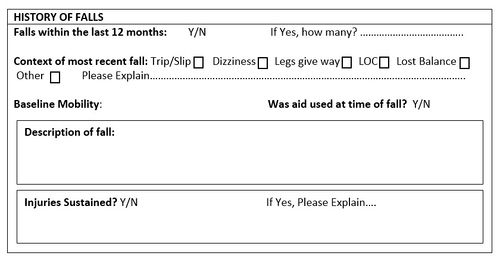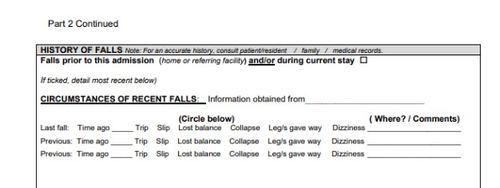Dementia Fall Risk Can Be Fun For Anyone
Dementia Fall Risk Can Be Fun For Anyone
Blog Article
The Greatest Guide To Dementia Fall Risk
Table of Contents9 Simple Techniques For Dementia Fall RiskDementia Fall Risk Things To Know Before You BuyGetting The Dementia Fall Risk To WorkTop Guidelines Of Dementia Fall Risk
A loss threat analysis checks to see how likely it is that you will fall. The assessment typically consists of: This consists of a collection of inquiries concerning your overall health and if you've had previous falls or issues with equilibrium, standing, and/or strolling.Interventions are recommendations that may minimize your threat of falling. STEADI includes 3 steps: you for your risk of dropping for your danger elements that can be improved to attempt to protect against falls (for example, balance troubles, impaired vision) to reduce your threat of dropping by making use of efficient approaches (for example, providing education and learning and sources), you may be asked numerous questions including: Have you fallen in the previous year? Are you worried about falling?
If it takes you 12 seconds or even more, it might imply you are at greater danger for a loss. This examination checks strength and balance.
Relocate one foot midway ahead, so the instep is touching the large toe of your other foot. Move one foot fully in front of the other, so the toes are touching the heel of your other foot.
Rumored Buzz on Dementia Fall Risk
A lot of falls take place as an outcome of multiple adding variables; for that reason, handling the risk of falling starts with identifying the elements that add to drop danger - Dementia Fall Risk. A few of the most pertinent threat variables consist of: History of prior fallsChronic medical conditionsAcute illnessImpaired gait and equilibrium, lower extremity weaknessCognitive impairmentChanges in visionCertain risky drugs and polypharmacyEnvironmental elements can likewise enhance the risk for drops, consisting of: Poor lightingUneven or harmed flooringWet or slippery floorsMissing or harmed handrails and order barsDamaged or poorly fitted equipment, such as beds, wheelchairs, or walkersImproper usage of assistive devicesInadequate supervision of the individuals living in the NF, consisting of those who exhibit hostile behaviorsA successful loss danger administration program requires a detailed professional analysis, with input from all participants of the interdisciplinary group

The treatment plan should likewise include treatments that are system-based, such as those that promote a safe atmosphere (proper lights, handrails, get bars, etc). The efficiency of the treatments ought to be reviewed occasionally, and the care strategy modified as essential to reflect adjustments in the autumn threat evaluation. Carrying out a loss danger monitoring system utilizing evidence-based Go Here ideal practice can minimize the frequency of falls in the NF, while restricting the potential for fall-related injuries.
The smart Trick of Dementia Fall Risk That Nobody is Talking About
The AGS/BGS standard recommends screening all adults matured 65 years and older for autumn risk annually. This screening includes asking people whether they have actually fallen 2 or even more times in the previous year or looked for clinical focus for a loss, or, if they have not fallen, whether they feel unsteady when walking.
People who have dropped when without injury needs to have their balance and stride assessed; those with gait or equilibrium problems need to obtain extra evaluation. A background of 1 loss without injury and without gait or equilibrium troubles does not necessitate additional evaluation past ongoing yearly autumn danger screening. Dementia Fall Risk. A fall threat evaluation is needed as part of the Welcome to Medicare examination

What Does Dementia Fall Risk Mean?
Documenting a falls background is among the high quality indicators for autumn prevention and management. A crucial component of danger evaluation is a medicine evaluation. A number of classes of medicines boost loss danger (Table 2). Psychoactive drugs particularly are independent forecasters of falls. These medicines have a tendency to be sedating, alter the sensorium, and harm equilibrium and gait.
Postural hypotension can frequently be minimized by lowering the dosage of blood pressurelowering medicines and/or stopping medications that have orthostatic hypotension as a side result. Use of above-the-knee support hose and sleeping with the head of the bed boosted might additionally minimize postural decreases in blood stress. The suggested components of a fall-focused checkup are shown in Box 1.

A Yank time higher than or equivalent to 12 seconds recommends high loss danger. Being incapable to stand up from a chair of knee elevation without utilizing one's arms suggests boosted autumn threat.
Report this page